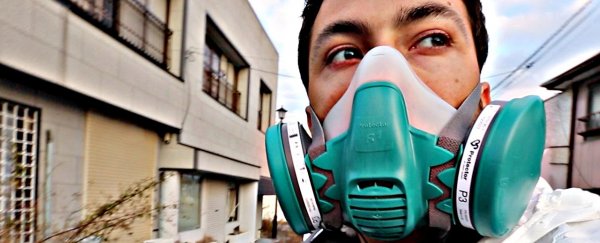As part of an upcoming documentary he's filming, Derek Muller from Veritasium has recently visited some of the world's most radioactive locations. Specifically, he's looking at levels of ionising radiation, which is radiation so powerful it can strip electrons from atoms - you know, the dangerous type.
In the latest episode, he takes us on a fascinating journey around the world, Geiger counter in hand, to compare the levels of ionising radiation in places such as Hiroshima, Fukushima and Chernobyl, to the amount in a banana.
Yes, that's right, bananas. The fruit contains potassium, some of which is naturally very slightly radioactive. A banana contains around 0.1 microsieverts (sieverts are the unit used to measure ionising radiation), which isn't too bad, seeing as on a daily basis just by being being alive we're exposed to around 0.1-0.2 microsieverts per hour.
To put that background radiation number into perspective, around 2 sieverts of ionising radiation is the amount that would kill you.
Derek's mission was to find out which humans are exposed to the most ionising radiation.
Along the way, he captures some breathtaking footage - like the hospital in Pripyat, Ukraine, where the firefighters who controlled the blaze at Chernobyl were treated, as well as the deserted and very eerie exclusion zone around Fukushima in Japan.
He also goes to Marie Curie's old lab, where, 80 years later, you can still read traces of radiation on the things she most commonly touched in her office - it's almost like a radioactive ghost.
Then there's the moment his Geiger counter gets overloaded in a deserted basement filled with dead firemen's uniforms, which would be enough to terrify me.
But most interesting is the fact that many of these post-apocalyptic landscapes aren't necessarily as radioactive as you might think, and, surprisingly, they're not the most radioactive places we know of.
Planes at cruising altitude, for example, are more radioactive than many of the spots Derek visits. People who undergo an CT scans are exposed to more radiation than the people in these locations. And astronauts onboard the ISS receive more ionising radiation than any of these.
But there is one clear, stand-out group of people who receives more ionising radiation every single day than anyone else…and you may be extremely surprised by who that is. You may even be one of them.
We don't want to give it all away though. Watch the fascinating episode above all the way to the end. Trust us, it's worth it.
You can also check out the haunting drone footage of Chernobyl below. That's how a city looks when all the people disappear.
 Source: Veritasium
Source: Veritasium
